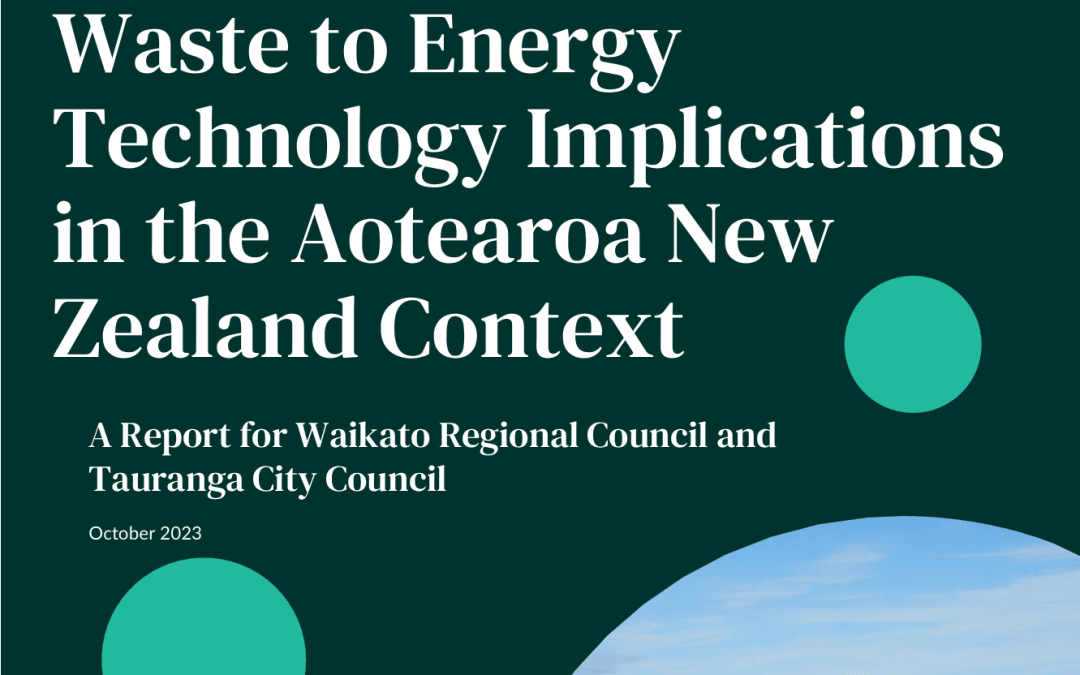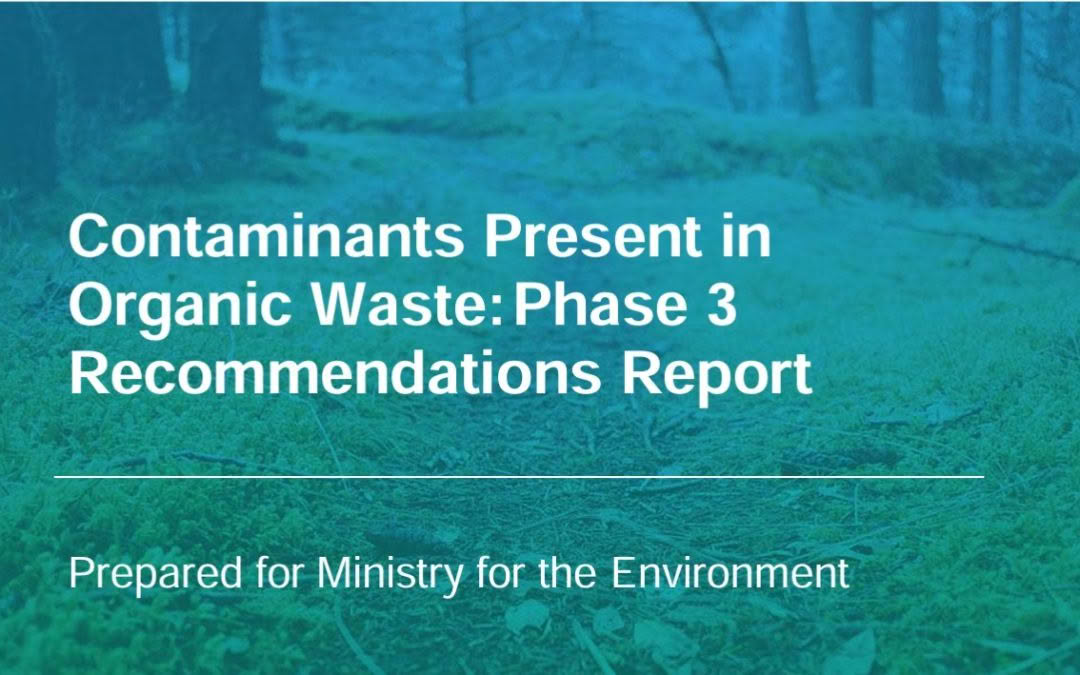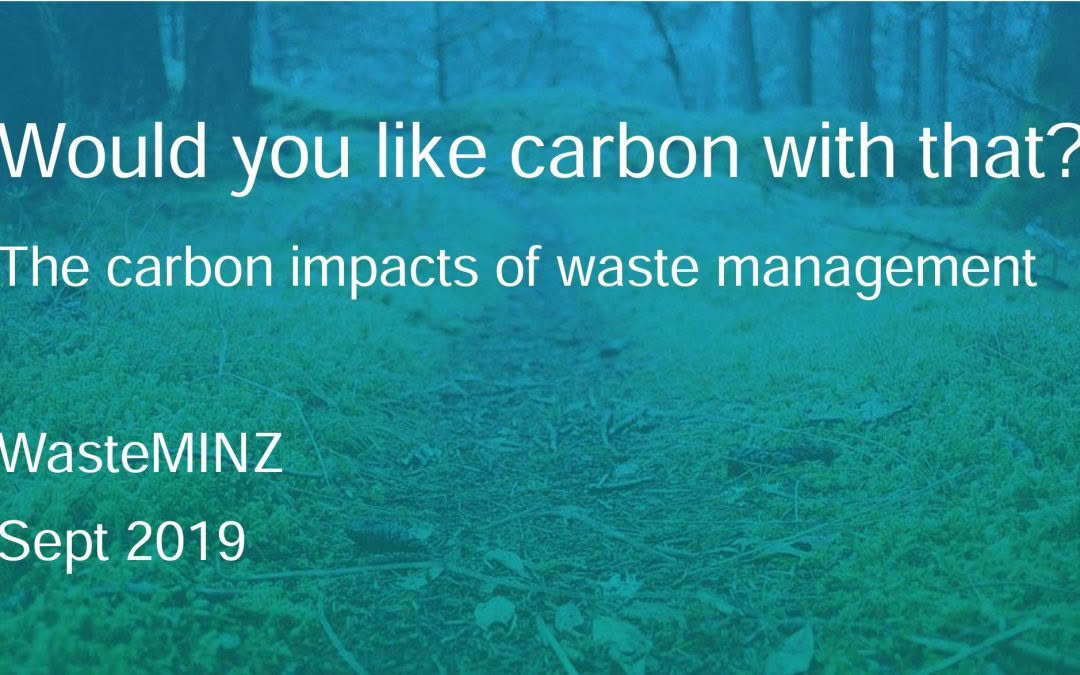
by Admin EunomiaNZ | 2 Oct 2024 | article, Disposal, Policy & Strategy, Reports, Strategy, Sustainability, Sustainable Business, Waste, Waste & Recycling
In September 2024 Eunomia produced a report for Waikato Regional and Tauranga City Councils that seeks to understand what place waste to energy has in Aotearoa.
The report presents outcomes on key waste to energy technologies and their potential application in New Zealand, and Waikato and Tauranga specifically. The study compares greenhouse gas emissions of four scenarios where three use WtE technologies and one uses landfill as the status quo.

by Admin EunomiaNZ | 20 Mar 2024 | article, Organic, Reports, Waste & Recycling
In February 2024 Eunomia, alongside Whetū Consulting Group and Massey University, published a report for the Ministry for the Environment with recommendations to reduce contaminants in organic waste. The report provides 35 holistic recommendations to improve the quality of organic waste at both household and industry levels.
The report aims to understand and address challenges posed by contaminants in organic waste material streams. Contaminants in organic material pose risks to soil, human, and animal health and limit the end markets for processed organic material.
For further information contact info@eunomia.co.nz

by Duncan Wilson | 13 Dec 2020 | article, Carbon, Disposal, Reports, Waste, Waste & Recycling
So you declared a climate emergency. What’s next?
Duncan Wilson presented at the WasteMINZ conference in October 2019 about how tackling waste can have a bigger carbon impact than you might think.
Officially waste accounts for 5% of NZ’s greenhouse gas emissions. But, by recycling and reducing consumption of products and materials, we can have an impact way beyond that 5%.
Click the button below to download a copy of the presentation.
by Duncan Wilson | 17 Oct 2018 | article, Councils, News, Policy & Strategy, Recycling, Sustainability, Sustainable Business, Waste, Waste & Recycling
In the course of our work we talk to lots of council members, stakeholders, and members of the public. The topic of Waste to Energy comes up regularly. Waste to Energy is common in many places overseas such as UK, parts of Europe, Japan, and it is becoming more common in China and the USA. But New Zealand doesn’t have any Waste to Energy facilities that process municipal waste. In this article for Revolve magazine Dr Dominic Hogg and Duncan Wilson examine the pros and cons of burning waste to generate energy.
Click the button below to download article:
Download
Or see the article in Revolve magazine:
Link
by Duncan Wilson | 31 May 2018 | article, Councils, News, Policy & Strategy, Recycling, Reports, Waste, Waste & Recycling
The discussion document Rebooting Recycling – What can Aotearoa do? has been released by WasteMINZ. Eunomia worked with WasteMINZ and the recycling industry to develop the document.
Overview:
The collapse in international recycling markets has left the recycling sector in New Zealand in a vulnerable position. Without positive action to address the issue, recyclable material could be sent to landfill, councils and communities will suffer financially, and operators could go out of business. Action from the Government is needed. There are some things that need to happen immediately, including:
– enabling access to funding,
– facilitating national communications, and
– obtaining better data on recyclable materials.
There are also some things that will take longer, but that will help build a more robust system and deliver a more circular economy. These actions include:
– revising the national waste strategy,
– changes to the waste disposal levy,
– product stewardship and design,
– ongoing communications, and
– positive public procurement of recycled products.
While there is a lot to do, everything that has been set out in this discussion paper can be achieved using existing funding sources and legislation. The sector is engaged and willing to work positively with the Government to ensure our sector is thriving.
Finally, this crisis also represents an opportunity, the opportunity to build a new system that can deliver better outcomes for our communities, our environment, and our economy. Together we can reboot recycling and create a circular economy for Aotearoa.
To download a copy of the discussion document click the button below:
Download
by Duncan Wilson | 2 May 2018 | article, Councils, Recent, Recycling, Reports, Strategy, Waste
In this article from Revolve magazine Duncan Wilson looks at the past and future of waste planning in New Zealand.
The way we manage waste has evolved significantly over the last 30 years. Unfortunately not a lot of credit for that can go to our waste planning. If we are going to meet the challenges of the next 30 years we are going to need to think differently. We are going to need to do things differently. Our waste plans need to be about more than just when and what bins get collected. They need to be about how we make our communities better.
To download the article click the download button below:
Download
by Duncan Wilson | 22 Jan 2018 | Councils, News, Policy, Recent, Recycling, Strategy, Waste
Eunomia worked with the WasteMINZ TA Forum to update the Local Government Waste Manifesto that we originally helped create in 2018. Since the first Manifesto was produced there have been a range of significant changes in the sector. These include the impacts of China’s ‘National Sword’ policy, the ongoing impacts of Covid 19 and the global economic recession, and a growing awareness around the need to tackle plastic pollution.
The updated Manifesto was released on 4 August 2020. It sets out a number of additional actions for Government that will enable real reductions in waste to landfill and reduce the costs borne by councils and their communities. Together with the original 5 actions, the key elements are:
- Review the New Zealand Waste Strategy to set a clear programme for action
- Expand the Waste Disposal Levy and progressively raise the levy to reduce waste to landfill
- Officially adopt the National Waste Data Framework to enable better planning and monitoring
- Introduce a Container Deposit Scheme to lift recycling rates and reduce litter and marine pollution
- Implement mandatory or co-designed product stewardship schemes for tyres, e-waste and, agrichemicals, and farm plastics
- Invest in onshore and local infrastructure for processing recovered materials
- Standardise household rubbish and recycling collection systems
- Take action on plastics and packaging to reduce pollution and make sure all packaging used or made in NZ can be re-used or recycled
To download a copy of the updated Manifesto click the download button below:
Download
To download a copy of the orignial Manifesto click the download button below:
Download
by Duncan Wilson | 2 Aug 2017 | article, News, Policy, Recent, Reports, Waste
Duncan Wilson is featured in the August issue of Local Government magazine, talking about the recent Eunomia report on New Zealand’s waste levy. Click the button below to download a copy of the article.
Download
by Duncan Wilson | 31 Jul 2017 | Reports, Waste
Eunomia has constructed this handy downloadable calculator to help landfill owners assess the potential financial impact of applying for a waste composition or capture and destruction Unique Emissions Factor (UEF).
The file runs in excel and requires version 2003 or more recent. You will also need to enable macros for it to run. If you have any questions or feedback please get in touch at info@eunomia.co.nz
Download
For more information on Unique Emissions Factors for waste see: Guide to Landfill Methane in the ETS
by Duncan Wilson | 23 Jul 2017 | News, Policy, Recent, Uncategorized, Waste
Our waste levy research report has generated a lot of interest. Here are some links to media articles:
http://www.radionz.co.nz/national/programmes/ninetonoon/audio/201849672/take-make-dispose-calls-for-landfill-levy-hike
http://www.stuff.co.nz/dominion-post/news/national/94816836/Reluctance-to-charge-more-people-dumping-fees-blamed-for-rise-in-landfill-waste
http://wellington.govt.nz/your-council/news/2017/07/waste-levy
http://www.scoop.co.nz/stories/PO1707/S00018/waste-disposal-levy-could-create-9000-jobs.htm
https://m.newsie.co.nz/news/42399-higher-levy-would-cut-waste-and-create-work.html
http://www.recyclingwasteworld.co.uk/news/new-zealand-could-increase-its-gva-by-287m-by-restructuring-its-waste-disposal-levy-says-eunomia-report/157045/
http://www.recyclingwasteworld.co.uk/news/new-zealand-could-increase-its-gva-by-287m-by-restructuring-its-waste-disposal-levy-says-eunomia-report/157045/
http://www.nzherald.co.nz/wanganui-chronicle/midweek/news/article.cfm?c_id=1503658&objectid=11885818
https://t.co/WsgHHqrwWP
https://twitter.com/hashtag/NZWasteLevy?src=hash
by Duncan Wilson | 23 Jul 2017 | Councils, News, Recent, Recycling, Reports, Waste
Eunomia worked with Auckland Council to produce this zero waste events guide. The guide is designed for the non-waste specialist, in particular event managers. It will help you reduce the amount of waste your events produce and work towards zero waste. It also signposts to useful detail in appendices and special case studies (available from Auckland Council), so you can drill down where you need more information.
Click the button to download a copy of the main guide.
Download
The key information is also available online through the zero waste events website. Click the link below:
Go to Link
by Duncan Wilson | 2 Jul 2017 | News, Organic, Policy, Recent, Recycling, Reports, Strategy, Sustainability, Waste
Eunomia Research & Consulting undertook research to improve understanding of the impacts of possible changes to the structure and rate of the Waste Disposal Levy.
The study, which was commissioned by a consortium of businesses and councils, showed that there are likely to be real benefits for NZ through putting in place a well-structured levy regime. The research found there would be significant benefits in terms of waste minimisation, employment, and the economy. Key features should include:
- Extending the levy to all types of fills
- A large increase in the rate of the levy
- A differential between ‘active’ waste and ‘inert’ waste
- An escalation to the target rates over time
- Increased monitoring and enforcement, and
- Targeted spending of levy income.
Download the summary report
Download
Download the full report
Download


